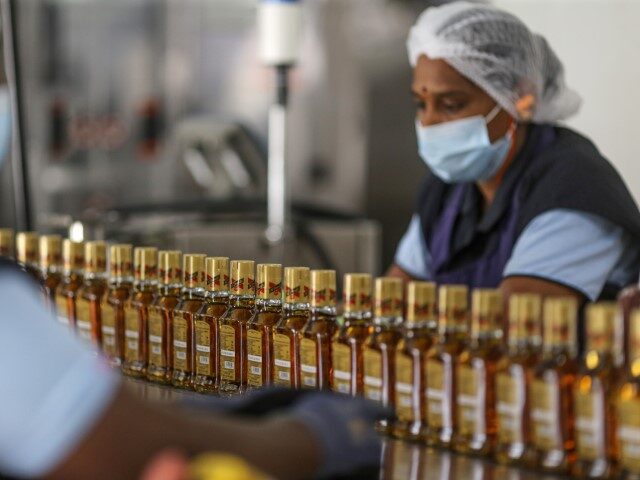The largest producer of whiskey in India, Allied Blenders and Distillers (ABD), began unprecedented liquor exports to Russia last month and is preparing a formal debut in that nation’s spirits market, multiple reports on Wednesday revealed.
The Russian alcohol market is the fourth largest in the world – after China, America, and Brazil – and primarily relies on domestic products. The major exception is whiskey: 91 percent of whiskey on the Russian market is imported, compared to nine percent of all alcohol.
The ongoing Russian invasion of Ukraine, which began nearly a decade ago but became an international cause célèbre last year following the announcement of a full-scale invasion of the country by the Russian military, has significantly disrupted the Russian economy. Some imports and exports have been affected by Western sanctions in response to the war – notably, Russian fossil fuels, the prices of which have fallen, though sales in new markets have increased – while others have disappeared from Russian markets of their own accord. The dearth of Western whiskey brands on Russian liquor store shelves appears to have created an opportunity for India.
According to India’s New Delhi Television (NDTV), citing the Russian newspaper Kommersant, ABD began sending its whiskey products to Russia in February and “is aiming to capture the market share vacated by Western brands that have stopped delivering to the country.” ABD is in a strong position to make this move, the network explained, as its products are already present in 20 countries. According to NDTV, “India currently produces 60 percent of the world’s whisky.”
First Post, an Indian news site, added the detail that ABD reportedly came to an agreement with Russian vodka company Alcohol Siberia Group (ASG) to distribute Officer’s Choice, its best-selling whiskey, in the country, along with another of its brands. The Indian brands will replace departing Western brands amid a 50-percent drop in Russian whiskey imports in 2022.
As of this month, the industry publication The Drinks Business described the Russian alcohol sector as significantly affected by Ukraine-related sanctions.
“Many of the global drinks giants have either mothballed operations or are seeking to sell up in Russia and there are now fears that consumers are increasingly at risk from potentially harmful illicit concoctions,” the magazine noted.
The domestic alcohol industry also met with multiple restrictions in U.S. states, primarily affecting Russian vodka, which is not especially popular or common in American liquor stores.
“Just 1.3% of vodka imports in the U.S. come from Russia these days, accounting for a mere $18.5 million in purchases in 2021,” Barron’s noted last year. “Compare that to France, better known for its wines, which exported $660 million worth of vodka to the U.S. last year. … Imports of vodka from Russia have declined almost 80% since 2011.”
Alcohol is the latest commercial industry in which India appears to have found an opportunity for itself in the ongoing Russia-Ukraine conflict. India has primarily focused its attention on buying Russian fossil fuels, particularly Russian crude oil. Russia became India’s top crude oil supplier in November; India imported 33 times more crude oil from Russia in December 2022 than in December 2021.
India is one of the world’s top oil refiners and has been buying the Russian oil at discounted rates, refining it, and selling refined oil products to Western nations, including America, which is allegedly sanctioning the Russian oil market. India was shipping 89,000 barrels of gasoline and diesel to New York per day, for example, as of February, much of it likely refined from Russian products. America bought $588 million in refined Indian oil products in November.
Indian officials have adamantly rejected pressure from Europe and America to stop buying Russian oil, pointing to Europe’s own dependence on Russian natural gas and accusing Western states of not having equal interest in supporting India in its own sovereignty disputes while demanding attention for Ukraine.
“We ended the financial year 2022, the purchases of Russian oil were not two percent, it was 0.2 percent,” Indian Oil Minister Hardeep Singh Puri said in November. “Moreover, we still buy a quarter of what Europe buys in one afternoon. So let’s be very clear about what the perspective is.”
Indian External Affairs Minister S. Jaishankar noted in an interview with an Austrian broadcaster in January his frustration with Europe’s silence on issues of importance to New Delhi.
“I can give you many instances of countries who have violated the sovereignty of another country and if I were to ask where Europe stood on a lot of those. I’m afraid I’ll get a long silence,” Jaishankar said.
“Europe imported, in the same period, six times the energy which India did,” Jaishankar continued, referring to the time period between February 2022, when the Russian full-scale invasion of Ukraine began, and January 2023. “If it is a matter of principle why didn’t Europe cut on the first day? Why didn’t on 25th February, a complete cut off of energy imports from Russia?”

COMMENTS
Please let us know if you're having issues with commenting.